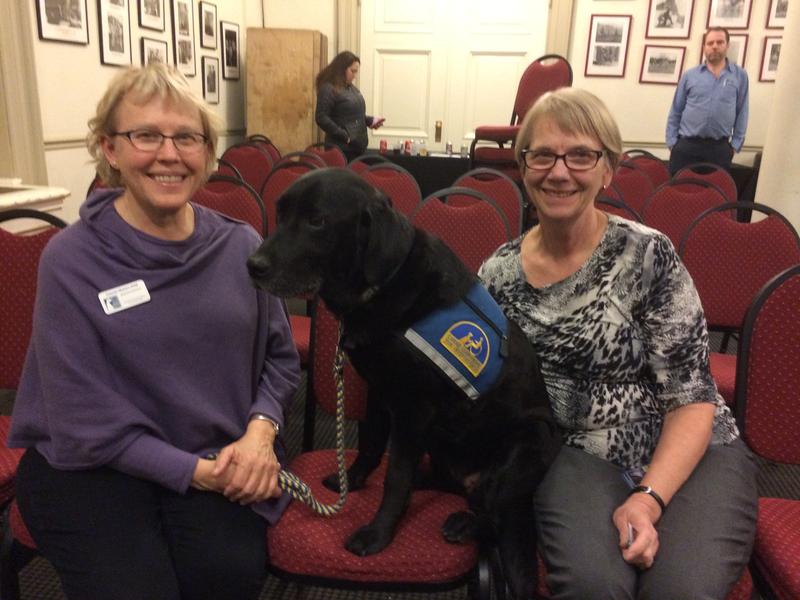
Molly is a nine-and-a-half-year-old, friendly, black mix of Labrador and golden retriever who can respond to more than 40 commands, including "sit" and "shake" (with her paw). But her most important function is lying quietly at the feet of reluctant witnesses when they testify in court.
Former Seattle prosecutor Ellen O'Neill Stephens came up with the idea of using dogs in court more than a decade ago, after seeing children who said they were victimized by sexual abuse freeze up in court. She now runs the Courthouse Dogs Foundation.
"When you have a calm dog like this, Molly, snuggled up to you while you're waiting for your hearing or sleeping at your feet while you're in the witness box — although that's a scary situation — you feel calm," she explained. "And when you feel calm, you're better able to tell the judge or the jury what happened to you."
Stephens' work was also inspired by seeing the special link between her 35-year-old son, who has cerebral palsy, and his assistance dog. She spoke to about 25 people at the New York City Bar Association recently about her foundation.
According to Stephens, 35 states, including New York, now allow specially trained dogs in court. The dogs are often employed by victims' advocacy groups, district attorneys and other organizations that work with the courts.
In New York, the Children's Home in Poughkeepsie was the first organization to use a specially-trained dog in court, in 2010. Psychologist and clinical director David Crenshaw said he now has two golden retrievers. He recalled a young woman who couldn't speak about her abuse until meeting a dog named Ace.
"When Ace was with her," he said, "she was able to put into words what she was feeling and was able to describe what had happened to her."
These animals are not therapy dogs. Those tend to be pets with added training. A few prosecutors use therapy dogs in their offices to comfort victims — though the Brooklyn D.A. got permission in 2015 to let one join a witness in court as needed.
Unlike therapy dogs, the canines that work directly with witnesses in court are called facility dogs. They are professionally raised from birth and graduate from certified assistance dog organizations, said veterinarian Celeste Walson, executive director of the Courthouse Dogs Foundation.
"These dogs have a very calm, non-reactive temperament," she said. "When the judge bangs his gavel it doesn't bother them, when people are upset they're innately very calm."
They can also lie for hours at the feet of a witness, and greet all types of people in a busy courthouse without getting jittery or searching for food.
So far, the Staten Island district attorney is the only prosecutor in New York City using a dog that meets these criteria. A spokesman said the dog's name is Bronksey and that he's gone to bench trials with witnesses and has two certified handlers.
Some offices balk at the cost of hiring handlers, but Walson said the dogs often come at a negligible price because they're provided by the organizations that raise them. Still, Stephens acknowledged the field is still evolving after initial concerns that a dog's presence could bias jurors.
"Every appellate court that has looked at this has determined that this is a valid accommodation if certain measures are taken to avoid any potential prejudice against the defendant," she said.
These measures include keeping the dog crouched down, out of the jurors' sight. Stephens said she also hoped to see trained dogs in courthouses assisting witnesses for both prosecutors and defendants.

